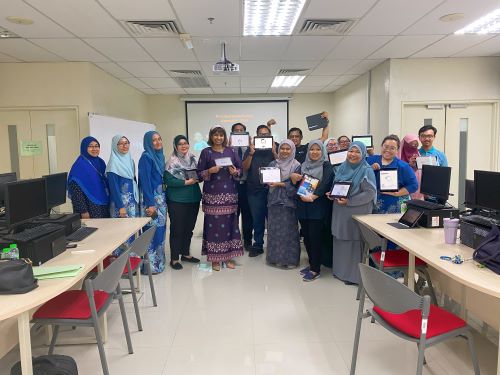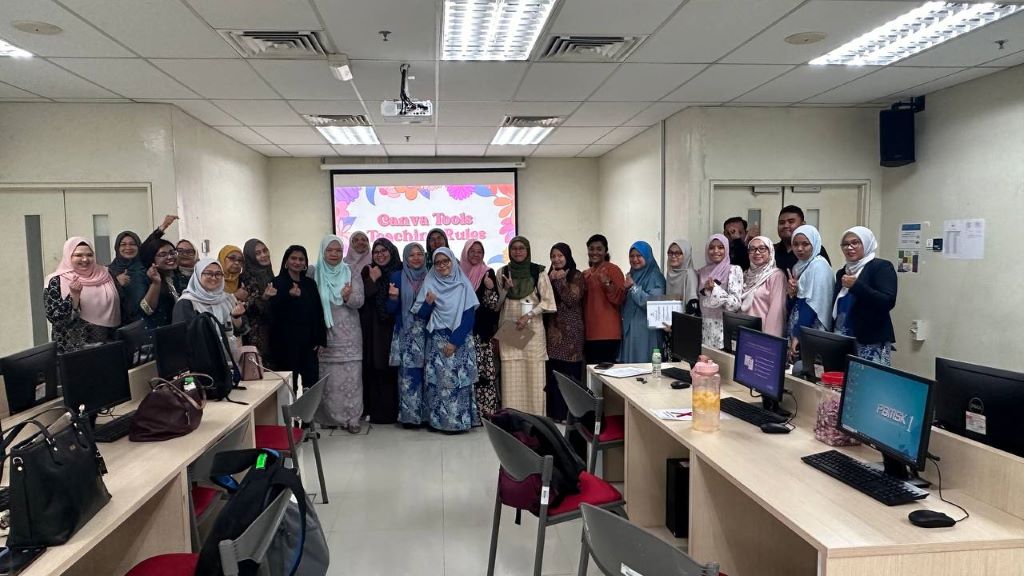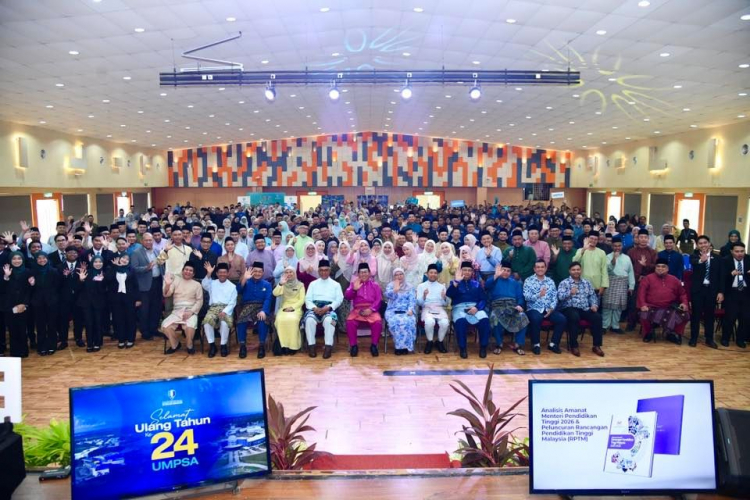Empowering Educators: Practical Instructional Workshop at CML, UMPSA enhances Instructional Approaches for the 21st Century
PEKAN, 19 August 2024 – In today's rapidly evolving educational landscape, adopting new instructional approaches are essential for language instructors to effectively engage and support their students.
New and effective approaches enable educators to create dynamic, relevant learning experiences that prepare students for the challenges of the 21st century, and ensures quality, relevant, and inclusive education for all.
Given the importance this matter, the Centre for Modern Languages (CML), Universiti Malaysia Pahang Al-Sultan Abdullah (UMPSA), conducted a one-day workshop entitled ‘Practical Instructional Approaches for Educators’, with the aim of exposing educators from schools and higher education institutions to instructional approaches relevant to current developments.
The workshop featured Professor Dr. Rebecca Adams, an expert in peer learning and peer interaction from the University of Memphis, the USA, who delivered a presentation entitled ‘Peer Learning in an English Language Classroom’.
Professor Adams focused on promoting communication in a second or a foreign language learning environment through peer interaction.
Her decade-long research has collected global data which include perspectives from TESOL professionals and instructors worldwide from countries such as Malaysia, China, Saudi Arabia and the United States.
Her research findings demonstrate that peer interaction in practical language classes, both online and in-person contexts, should consider the individual experiences of students. This includes how they interact with peers, collaborate, and respond to constructive criticism.
Professor Adams further emphasised that peer interaction is crucial, because for most second and foreign language learners, opportunities to use and communicate in the target language most frequently occur in classrooms and with peers.
Therefore, understanding how peers communicate, even with imperfect language knowledge, and learning together is key to enhancing the language learning experience and language mastery.
Through repeated engagement in communication, despite the challenges, students can cognitively connect words and linguistic structures with the meanings they express.
The afternoon sessions highlighted the utilisation of digital tools in language instructions presented by experts from CML, namely Associate Professor Dr. Hafizoah Kassim, Deputy Dean of Research and Postgraduate Studies, Dr. Azwin Arif Abdul Rahim, Head of the MScTILS Programme, and Dr. Umi Kalsom Masrom, Head of the English Language Department.
They emphasised the application of Generative AI tools such as ChatGPT, iPad and Canva in language instructions.
These sessions exposed participants to hands-on experiences and practical strategies to enhance their instructions, ensuring they are well-prepared to meet the evolving needs of their students and the educational system.
These sessions were also part of CML efforts to support the Ministry of Higher Education Malaysia (MoHE)’s and UMPSA’s initiative to strengthen and cultivate the use of artificial intelligence (AI) in education.
More than 130 participants attended the workshop, including teachers and university lecturers from various institutions including Universiti Malaya (UM), Universiti Putra Malaysia (UPM), Universiti Malaysia Terengganu (UMT), Universiti Teknologi MARA (UiTM) Pahang Branch, Universiti Tenaga Nasional (UNITEN), DRB-HICOM University of Automotive Malaysia, Universiti Islam Pahang Sultan Ahmad Shah (UnIPSAS), and Kolej Poly-Tech MARA Kuantan.
Also in attendance were officers from the Kuantan District Education Office (PPD), Aminuddin Baki Institute (IAB), English Language Teaching Center, and teachers from Sekolah Berasrama Penuh Integrasi Kuantan, Maktab Rendah Sains MARA (MRSM) Tun Abdul Razak, and other secondary schools and Chinese National-Type Schools (SJKC) around Pahang.

With such high participation, CML took the opportunity to support UMPSA’s Strategic Plan 2021–2025, specifically Strategic Objective 1, which aims to increase postgraduate enrolment specifically from industry.
CML postgraduate programmes were promoted to the attending representatives.
The organising committee received constructive feedback including the need to expose language instructors to more Generative AI tools in education, and the relevance of the workshop content in today’s ever-changing educational environment.
According to Head of the Language Department at MRSM Tun Abdul Razak, Shariza Shabin, this programme is highly relevant to the current teaching and learning needs.
“In line with MARA's mission to produce holistic students, the knowledge shared acts as a catalyst for the dedicated efforts of MRSM TAR teachers who could attend courses organised by UMPSA, particularly by the CML,” she said.
This workshop has enhanced CML’s visibility in the fields of teaching and learning particularly when the use of technology and AI are needed, and research within the academic community especially in the East coast of Malaysia.
According to Associate Professor Dr. Hafizoah Kassim, the program director, more of such programmes will be conducted from time to time as these workshops facilitate opportunities for networking and strategic collaboration between CML and the participating institutions in relevant areas.
Such programmes are also in line with the Malaysian Education Blueprint (PPPM) 2013-2025, which emphasises the improvement of English language proficiency among students, the empowerment of teachers and educators in providing more effective teaching.
By continuously enhancing the teaching and learning of English, CML directly contributes to the achievement of the PPPM’s aspirations to make Malaysia a nation with a world-class education system, where English is recognised as an important and strategic second language in the global context.
By: Hafizoah Kassim, Wan Jumani Fauzi And Amy Zulaikha Mohd Ali, Centre for Modern Languages (CML)
- 149 views



 Reports by:
Reports by: 






